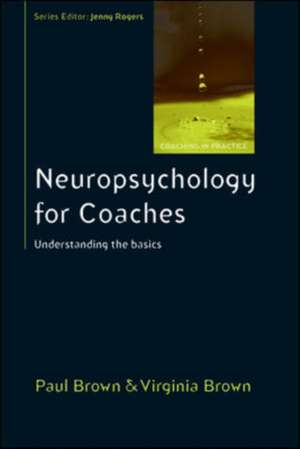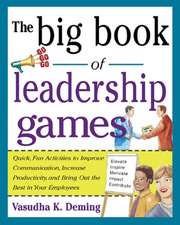Neuropsychology for Coaches: Understanding the Basics
Autor Paul Brown, Virginia Brownen Limba Engleză Paperback – 16 aug 2012
Using a systemic model of emotions, energy and change, Paul Brown and Virginia Brown show coaches how to integrate the client's life experience into coaching and create change. This is a must read for all practising coaches.
"This book is scattered with insightful, thought-provoking and occasionally beautiful analogies and metaphors, which any reader would be hard-pressed not to be challenged by. The (unrelated) Browns absolutely illustrate the importance for coaches of having an understanding of how the brain works."
Coaching at Work, March 2013
"The OU coaching series always provides a reliable read for the coach and this is no exception ... The authors have kept the neuroscience refreshingly simple, choosing to focus on key evidence based principles of relevance to coaching."
The International Journal of Mentoring and Coaching, Volume X Issue 2, December 2012
"This book is a delicious feast of neuroscience. Bravo!"
Nancy Kline, President, Time To Think, UK
“It’s rare to find an accessible, engaging book that combines current neuropsychological theory with working examples for executive coaching. At last here is one that brings the two together seamlessly."
Linda Aspey, Managing Director, Coaching for Leaders
“At last, a book that embeds the practice of coaching into what we know of how the brain works - rather than one that tells you about the brain, then leaves the coach to work it out; or one that tells you about techniques, then adds in the brain information as something of a 'P.S'."
Ann James, Executive Coach / Director, Thinking Space
"At long last, a rigorous book on neuropsychology that is both palatable and practically applicable for executive coaches."
Dr Tara Swart, Neuroscientist, medical doctor and executive coach, Executive Performance Ltd.
“Introducing the basic functioning of the brain, this book shows that humanity and high performance are indeed fraternal twins. A most useful guide!”
Anette Prehn, MA in social science, brain-based executive coach (PCC), author of Play Your Brain
"In a world of psuedo-theory and airport quick reads, Professor Paul Brown and Virginia Brown offer something most refreshing: hard science married with the intimate relationship between coach and executive."
Dr. Christina L. Lafferty, National Defense University, Washington D.C, USA
“Paul and Virginia Brown have done a great job in reviewing a lot of the burgeoning research and literature on Neuropsychology and making it accessible and useable by executive coaches in their work.”
Peter Hawkins, Professor of Leadership at Henley Business School, founder and Chairman Emeritus of Bath Consultancy Group & co-founder of Centre for Supervision and Team Development, UK
Preț: 242.00 lei
Nou
Puncte Express: 363
Preț estimativ în valută:
46.31€ • 48.29$ • 38.49£
46.31€ • 48.29$ • 38.49£
Carte tipărită la comandă
Livrare economică 21 martie-04 aprilie
Preluare comenzi: 021 569.72.76
Specificații
ISBN-13: 9780335245475
ISBN-10: 0335245471
Pagini: 160
Ilustrații: black & white illustrations
Dimensiuni: 154 x 233 x 10 mm
Greutate: 0.23 kg
Editura: McGraw Hill Education
Colecția Open University Press
Locul publicării:United Kingdom
ISBN-10: 0335245471
Pagini: 160
Ilustrații: black & white illustrations
Dimensiuni: 154 x 233 x 10 mm
Greutate: 0.23 kg
Editura: McGraw Hill Education
Colecția Open University Press
Locul publicării:United Kingdom
Cuprins
Series editor's preface
PrefaceBiographical beginnings: making sense of the brain
Regulation and Relationship: carrier signals between coach and client
Oxytocin and other clever chemicals
Wondering: the basis for knowing and change
Neurobehavioural modelling (NBM)
Behavioural change that sticks
Relationships that affect change and development
Affective interaction
Intelligent emotions
NBM revisited
Glossary
Bibliography
PrefaceBiographical beginnings: making sense of the brain
Regulation and Relationship: carrier signals between coach and client
Oxytocin and other clever chemicals
Wondering: the basis for knowing and change
Neurobehavioural modelling (NBM)
Behavioural change that sticks
Relationships that affect change and development
Affective interaction
Intelligent emotions
NBM revisited
Glossary
Bibliography







